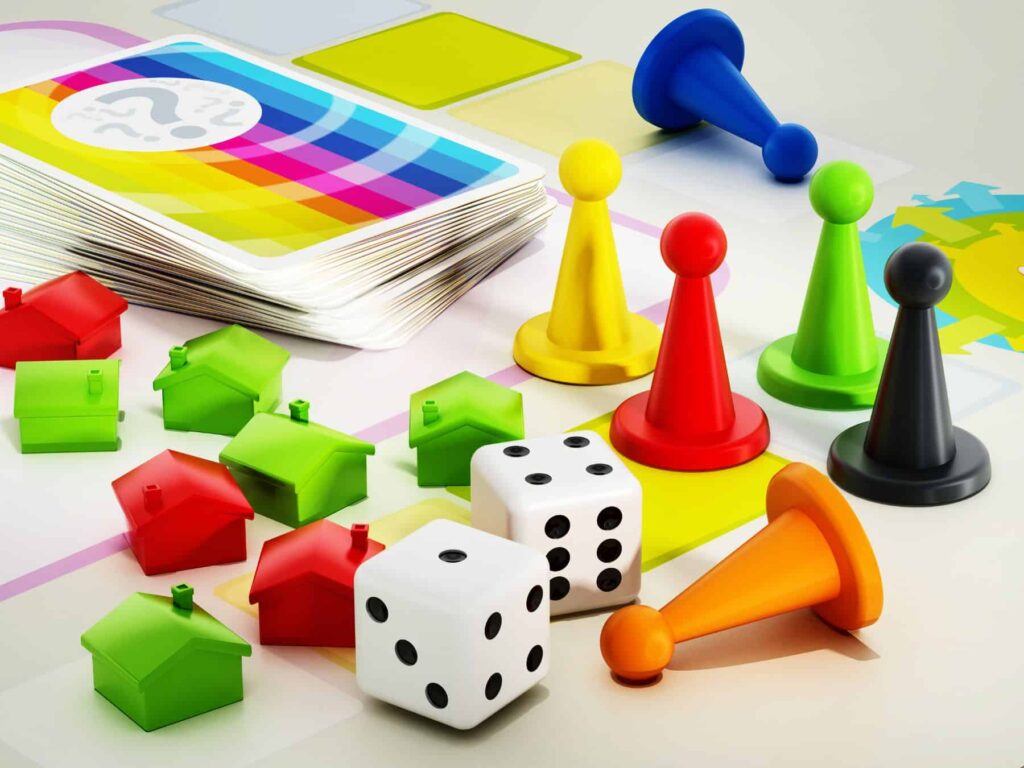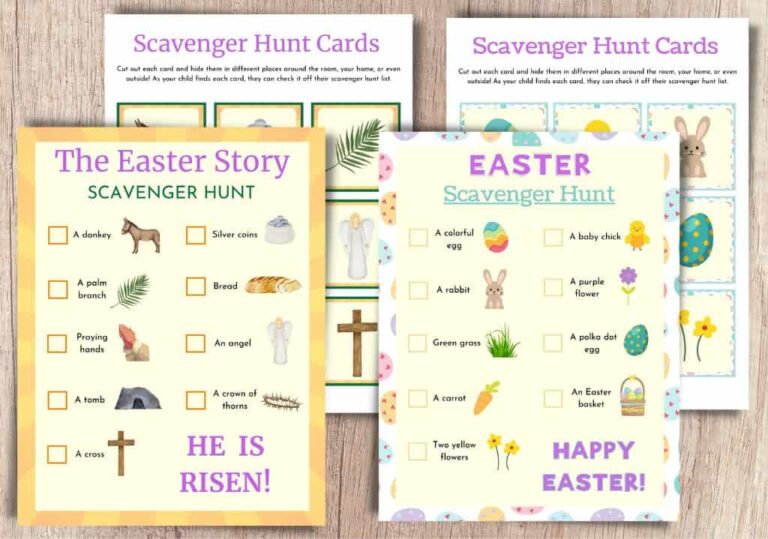Educational Games for Kids (and Why They’re Worth Using in Your Homeschool)

This post contains affiliate links, meaning that I’ll earn a small commission (at no extra cost to you) if you make a purchase using these links. As an Amazon Associate I earn from qualifying purchases. See my disclosure page to learn more.
One of my favorite things about homeschooling is the freedom to make learning fun and interesting. And honestly, what’s more fun than games?! Whether it’s a silly preschool game that gets everyone wiggling or a strategy game that has your tweens plotting their next move, games can sneak in a ton of learning without anyone even realizing it.
My kids have always loved playing games, and over the years we have found so many awesome ones (as well as ones that weren’t our favorite). So today I want to share some of the best educational games for kids (and families) that we’ve come across, broken down by age group. But first, why are games such a great addition to your homeschool day anyways?
Why Even Include Games?
Games aren’t just a way to keep kids busy. They can actually be little learning powerhouses that help introduce or reinforce skills, concepts, and topics that you are working on. Plus, they add an element of fun to your day and can mix things up a little when things aren’t going to plan and everyone needs a break! Games are also beneficial because:
- Kids stay engaged longer. Somehow, when math facts show up in a game, the whining magically disappears!
- Mistakes feel safe. In a game, losing a turn or trying again doesn’t feel like “failure”—it’s just part of playing.
- They build real-world skills. Patience, teamwork, strategy, persistence, these are skills we all want our kids to have.
- They stick in kids’ memories. That fraction lesson might fade, but they’ll remember the time they beat Dad at a math dice game!
- Family connection. Playing together isn’t just about learning—it’s about laughing, competing (nicely, usually!), and making memories.
Some homeschoolers even call this “gameschooling,” which is using high-quality games as part of their curriculum.
Educational Games for Kids – Top Picks (by Age Group)
There are so many amazing games out there now, that it can be overwhelming to pick the right ones. And what one kid loves, another may not (that definitely happens at our house!), but here are some of tried-and-true favorites that sneak in learning while keeping things fun.
Toddlers and Preschoolers
At this age, short, simple games are best, so lots of colors, movement, early learning skills, and of course, plenty of laughs!
- Monkey Around – A movement game that has toddlers hopping, hugging, and balancing. Great for motor skills.
- Sneaky, Snacky Squirrel – Collect colored acorns with a squirrel-shaped squeezer. Fine motor and color recognition. We played this game SO many times when my kids were younger!
- Shelby’s Snack Shack – A fun counting and number game with dog bones. Another one of my kids favorites!
- Candy Land – A classic color-matching board game.
- Hi Ho! Cherry-O – Another classic game, perfect for early counting and number recognition.
- Cootie – Be the first one to build your bug piece-by piece, creating different silly combinations each time you play.
- Animal Upon Animal Junior – A stacking game where kids balance wooden animals. Builds dexterity and patience! And when they’ve mastered the junior edition, they can move on to the harder version of the game.
- Don’t Break the Ice – Tap out blocks of “ice” without letting the penguin fall. Simple physics and fine motor play. Always a fun choice in my opinion!
- Memory/Matching Game – These type of games are classics for a reason! They’re simple to play, but work on important skills like focus, matching, and memory. Plus you can find these memory games in almost any theme that your kids likes!
💡 Tip: Keep game time short and let little ones take the lead. They learn just as much from the process as the “rules.”
Early Elementary
At this age, kids are ready for a bit more strategy and problem-solving, but games should still be simple and fun. Here are some games that your younger kids will love playing:
- Match Madness – Race to arrange a set of 5 board game cubes to match a pattern shown on a card in this fast-paced tile matching game that tests your dexterity and pattern recognition skills.
- Zingo! – A bingo-style matching game that’s great for reading readiness or working on math skills.
- Dinosaur Escape – A cooperative game where everyone works together to rescue dinosaurs.
- Sequence for Kids – Strategic but simple. Great intro to logic and planning.
- Sum Swamp – A math adventure game that makes addition and subtraction fun.
- Outfoxed! – A cooperative detective game where kids work together to solve a mystery. Still one of my kids favorite games!
- Guess in 10 – Builds logic, critical thinking, and subject knowledge. And there’s lots of topics to pick from including Animal Planet, States of America, Things That Go, Foods Around the World, Landmarks, space, and more. Plus they even have a junior edition for younger kids.
- Math Dice Jr. – Roll dice, add numbers together, and race to the finish line. Perfect for math practice.
- Spot It! – A fast-paced matching game for visual perception and quick reflexes. My kids always get really into this game! And there’s even special editions for themes like camping, fishing, animals, and dinosaurs.
💡 Tip: Early elementary kids love cooperative games, which are also great for kids who tend to melt down when they lose!
Upper Elementary/Middle School
Older kids can handle games with more rules and deeper strategies. This is where learning and fun really come together!
- Klondice– A fast moving dice game that combines strategy and luck. One of my families go to games!
- Rapid Rumble – A fast paced thinking game where you try to be the first to match your letters to the categories.
- Wordplay for Kids – Perfect for vocabulary, word building skills and spelling practice.
- Sequence – Still fun at this age, especially with more complex strategies.
- Tapple – One of our favorite word games that can easily be used for older kids (and adults!) too.
- Catan: Family Edition – Introduces resource management, trade, and strategy.
- Ticket to Ride: First Journey – Geography and planning all wrapped up in a fun adventure.
- Blokus – A puzzle/strategy game that builds spatial awareness and critical thinking.
- Qwirkle – Match colors and shapes to score points. Combines pattern recognition with strategy.
- Scrabble, Boggle, or Bananagrams – All are great for building vocabulary and spelling.
- Prime Climb – A colorful math board game that teaches multiplication, division, and factors, but in a fun way.
- P for Pizza – A fast paced game where you try to be the first player to say a word that links the letter on one card to the category on another. And for younger kids they make an equally fun P for Pizza kids version!
💡 Tip: Let older kids teach YOU the rules sometimes. It gives them ownership and builds confidence.
Games for Teens (13+)
Once kids hit the teen years, they’re ready for more complex games that involve deeper strategy, negotiation, and critical thinking. These games are fantastic for problem-solving and even life skills like budgeting, planning, and teamwork, plus they can be lots of fun to play as well!
- Catan – The classic resource-trading and settlement-building game. Perfect for strategy, negotiation, and long-term planning. A favorite family game night choice at our house!
- Ticket to Ride – A train adventure game that teaches geography, planning, and resource management.
- Carcassonne – A tile-laying game where players build medieval cities and roads. Builds spatial reasoning and strategy.
- 7 Wonders – Quick-paced civilization-building game that combines history and critical thinking.
- Pandemic – A cooperative game where players work together to stop global outbreaks. Encourages teamwork and problem-solving.
- Chess – A timeless classic that builds patience, strategy, and logic. For beginners this is a great set and is what my son used when learning how to play chess, I highly recommend it! And there’s even a chess set for the youngest of learners that uses fun stories to teach the rules of chess!
- Codenames – A fun word-association game that works well in groups (teens love the competitive edge!). And for an added twist, or as a way to involve younger kids, try Codenames picture version!
- Risk – Strategy, geography, and planning all in one. Though fair warning, it’s a long game!
- Racko – A classic math card game with number sequencing using luck and strategy. A favorite for my son and I!
💡 Tip: Teens love being challenged, so let them learn the rules first and teach the family how to play, building leadership and confidence.
Games for the Whole Family
Some games work well across different ages, making them perfect for family nights. These are the a few that bring everyone to the table…laughing, competing, and learning together!
- Uno – Definitely a classic for a reason! It’s easy to learn, perfect for all ages, and sneaks in number and color recognition for younger kids. Then if you want to take your Uno game to the next level, try Uno Attack! And for younger kids who have a hard time holding the cards, these card holders are a life-saver!
- Spot It! – Fast-paced matching that’s fun for both kids and adults. My kids always get super competitive with this game for some reason!
- Codenames: Pictures – A family-friendly version of the word association game that works well for mixed ages.
- Apples to Apples (Family/Junior Edition) – Vocabulary, humor, and creativity all rolled into one. This game is always a big hit at our house, as is a similar, and equally fun game called Grounded For Life! Laughs are pretty much a guarantee with both of these games!
- Farkle – A risk-taking, dice-rolling game that mixes luck and strategy! One of our absolute favorite family game night games to play!
- Pass the Pigs – A game of luck, probability, and risk taking where you roll the pigs instead of dice and try to be the first player to score 100 points.
- Charades or Pictionary – Both are classics that get the whole family together for some quick thinking and laughing! In charades you act out words or phrases for everyone to guess (there’s even a younger version with picture cards so no reading is required). And in Pictionary, you draw what is on the card while the other players try and guess what you’re drawing. To add another level of drawing fun, try Pictionary Sketch Squad where you work as a team to figure out the answer.
- Forbidden Island – A cooperative adventure where the family works together to escape before the island sinks.
- Guess Who? – Another classic game that’s fun for younger kids, but surprisingly competitive when older players join in!
- 5 Second Rule – You have only 5 seconds to name three things that fit each topic listed on the card. This game always makes for some fun family time! And if you have younger kids, try the 5 Second Rule Junior edition.
- Headbanz – My kids loved this guessing game where you need to ask questions in order to guess the word that you have on your headband.
- Blank Slate – A fun word association game where you score points when “great minds think alike!”
- What Do You Meme? – A card game where you need to get creative and compete to make the funniest memes by choosing the best caption card to describe the photo for each round.
💡 Tip: Keep a few family favorites handy and rotate them—family game night doesn’t have to be fancy, just consistent.
Games That Can Be Played Alone
These games are perfect for those times when your child wants to play a game, but doesn’t have anyone around to play with. They’re also great for when they just need a little break from their regular school work!
- The Genius Square – A fun STEM puzzle game for ages 6 and up that can be played solo (or with others if you want).
- Cat Crimes and Dog Crimes – Kids use critical reasoning and logical deduction skills as they go through challenges and solve the mystery of which cat (or dog) is to blame! This is designed to be a single player game, but my kids always like working together when they play these.
- Rush Hour – With challenges ranging from beginner to expert, kids slide cars and trucks to create a clear path for the red car to exit. It’s an escape puzzle that works on critical skills, problem-solving, and strategic thinking…all while having fun!
- Gravity Maze – Another single player logic puzzle that gets kids thinking as they complete different levels and challenges in this fun marble game.
- Q-bitz Solo – Kids try to recreate the displayed shape in the allotted time frame while working on their visual agility, memory, pattern identifications and hand eye coordination. This is another game that can be played solo or with one other player.
- A Gentle Rain – This is a slower paced, low-stakes, no pressure tile-laying puzzle game that can be played alone or with others. Delicious is another slower paced game (for older kids/teens) that’s either played alone or with multiple players and has a beautiful garden theme.
- Kanoodle – Logic puzzles that are great for solo play. There’s also a Kanoodle Junior version for younger kiddos. And as a bonus, they are the perfect size for travel!
- Cats and Boxes – A puzzle and logic game that builds concentration, problem-solving abilities and deduction skills. And if cats aren’t your kid’s thing, they also have a squirrel themed version called Squirrels Go Nuts!
- Katamino – This brain teaser is a favorite in logic games and strategy puzzles and can be played solo or with 2 players.
- Solitaire – No list of solo player games would be complete with a classic card game like solitaire! And if you’re child has never played before, or if they (or you!) need a refresher, this how to play solitaire book or book of solitaire games for kids will definitely be helpful!
Game Companies That We Love
We have collected a crazy amount of games over the years, and many of them tend to be from the same companies. Here are a few of the brands that we have come to love when buying educational games for our homeschool (or even games and toys that are just plain fun!):
- Peaceable Kingdom – Lots of high quality games for younger and elementary age kids, with many of them being cooperative play style games.
- Asmodee – This company makes some of the most popular games out there right now like Lego Monkey Palace, Catan, Ticket to Ride, Azul, Spot It, Splendor, 7 Wonders, and more.
- Thinkfun – A great assortment of games, logic puzzles, and more
- Educational Insights – Games and learning toys for all ages.
- Learning Resources – Another great site with educational games as well as other learning toys and products.
- MindWare – We have ordered, and enjoyed, many games and educational toys from here over the years.
- Fat Brain Toys – While they aren’t solely a game company, they do have games and products that we’ve enjoyed.
- And of course no game list would be complete without big brands like Hasbro, Mattel Games, Exploding Kittens, Ravensburger, Spin Master Games, and Gamewright.
How to Use Educational Games in Your Homeschool
Games are great to play just for fun, or together as a family night activity (here are even more ways to have a fun time together as a family!), but they’re also great learning tools since there are so many great options out there now for educational games for kids. Here are a few easy ways to fit games into your homeschool without making it feel like extra work:
- Morning warm-up – Play a short game to get everyone’s brains going.
- Lesson reinforcement – Swap out worksheets for a game that covers the same concept.
- Family game nights – Make memories while learning together.
- Choice time – Let kids pick a game that fits their interests (math, words, puzzles, coding, geography).
- Break time– When the day isn’t going as planned and everyone could use a little break, grab a game and take some time to play (while still learning!).
- Review sessions – Use games instead of flashcards to add in some fun!
Organizing and Storing Your Games
One of the biggest challenges of building a great homeschool game collection is keeping everything neat and all the pieces together! A little organization goes a long way in making game time smooth and enjoyable. Here are some handy products and ideas to help (And some of these ideas are great for keeping puzzles organized as well!):
- Plastic Drawer Units – Perfect for storing smaller games, card decks, and dice and come in a variety of colors and sizes.
- Zip-top Bags or Mesh Pouches – Keep card games or dice sets contained and easy to grab. And there are also larger mesh bags that can hold the entire game if you’d rather save space and store them in pouches instead of their original boxes. They work great for puzzles as well if you cut out the picture of what the finished puzzle looks like and put it in the bag!
- Over-the-Door Shoe Organizer – Each pocket can hold a small game, deck of cards, set of flashcards, and more.
- Clear Storage Bins with Lids – Stackable bins make it easy to group games by age or subject and come in a wide variety of sizes.
- Game Piece Organizers (like tackle boxes or bead organizers) – Keep loose dice, tokens, and pieces sorted.
- Rolling Carts – A mobile ‘gameschool cart’ makes it simple to bring games to the table and tuck them away afterward and come in a variety of sizes and styles, like ones with drawers, and ones that are all open.
- Shelf Dividers or Magazine Holders – Store board games vertically like books to save space.
- Label Maker or Printable Labels (in white or in fun colors!) – Make finding and returning games easier for the whole family by adding labels to the games or shelves, well in theory this will help anyways!
- Elastic bands – These ones are designed for going around game boxes to keep boxes from coming open and spilling pieces all over the floor!
- Card holders – While not exactly a way to organize or store games, these card holders are perfect for younger kids, as they making holding playing cards so much easier for little hands (or anyone who has a hard time holding cards). You can also get a paddle style holder or one with a table top stand for even easier card holding!
As you can see, games don’t have to just be “fun extras” that you do at the end of the day or for family game nights. They can also be a core part of learning! Whether your preschooler is counting cherries or your middle schooler is trading resources in Catan, educational games for kids can teach real skills while keeping the atmosphere fun and engaging.
So the next time your homeschool day feels a little sluggish (or when the kids complain about being bored!), pull out a game and watch as your kids combine learning and fun, plus you may even want to join in yourself!































